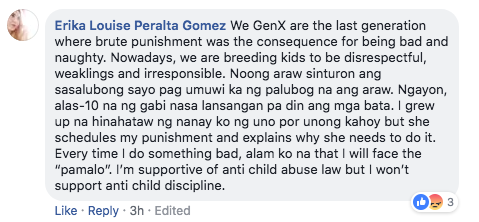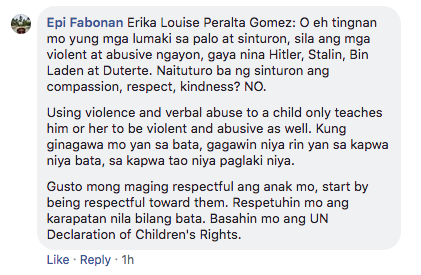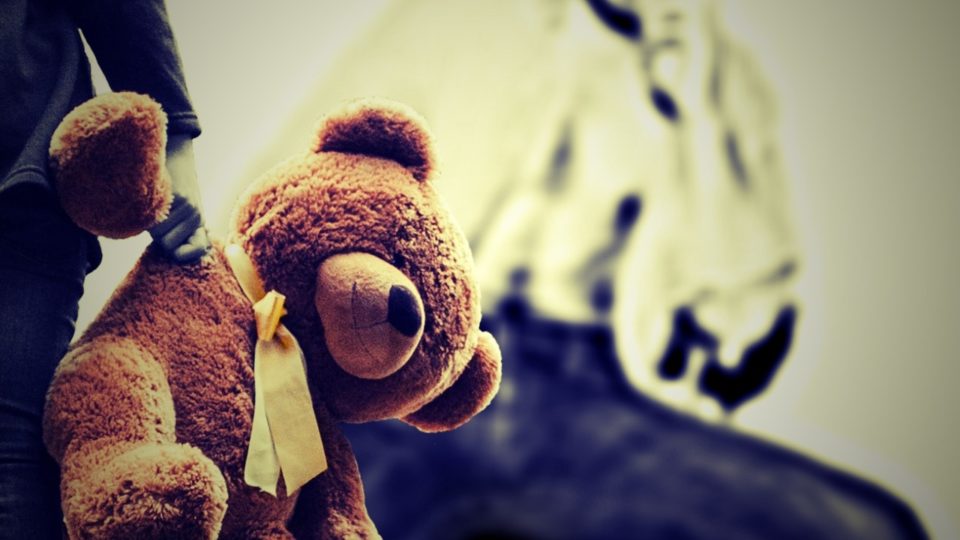Filipino parents generally believe that spanking children is fine, but a new Senate bill wants to put a stop to that.
The Senate of the Philippines yesterday passed a bill on the third reading which seeks to protect children from physical and mental violence and promote positive discipline at homes and in various places.
Called Senate Bill No. 1477 or the Positive Discipline Children Act of 2017, the bill prohibits families and caregivers from inflicting corporal punishment to children. The bill defines the following as examples of corporal punishment:
- beating, kicking, slapping a child using an instrument such as whip or belt
- pulling hair, shaking, dragging, or throwing a child
- forcing a child to squat, stand, or sit in a contorted position
- using a substance that can endanger a child such as fire, ice, alcohol, or smoke
- tying up a child, imprisoning a child
- verbal abuse or cursing a child
- humiliating a child
Those found guilty during the first instance will be given a written citation by the officials of their barangay (village). In the second infraction, another written citation will be given as well as mandatory counseling. If perpetrators abuse for the third time, the officials will file a formal complaint against them.
It’s not uncommon for children to be physically disciplined in the Philippines. Spanking is generally accepted, although most Filipinos believe that beating to the point of bruising is a form of child abuse.
In a survey conducted by the UNICEF in 2016, 3 out of 4 of their respondents have experienced physical violence during their childhood. 60 percent of these cases happened right in their homes.
In a statement, one of the sponsors of the bill Senator Risa Hontiveros said: “Corporal punishment, while seemingly benign, poses a serious danger not only because of its prevalence in our households and communities but because of its appearance of inoffensiveness.”
The bill was also sponsored by senators Grace Poe, Nancy Binay, and Leila de Lima.
A counterpart measure in Congress called House Bill 8329 remains pending.
While the Senate bill has not yet been signed into law, some netizens are already against it, such as Michael Ramira.
He wrote on Hontiveros’ Facebook account: “It’s like this in America. Your child will call the cops if you hit them. Was this good for them? Just compare their school system vs. the Philippines in terms of discipline. You answer that.”

Rex Sanchez thinks spanking brings up decent human beings.
He wrote on Hontiveros’ wall: “Can’t you do anything else? You must give the responsibility to the parents. Why was it when we were kids we were spanked? We became good people. Usually it’s the young people now who commit crime. You’re doing useless nonesense.”

Erika Gomez is proud to have been at the receiving end of corporal punishment when she was a child. She wrote: “We Gen X are the last generation where brute punishment was the consequence for being bad and naughty. Nowadays, we are breeding kids to be disrespectful, weaklings and irresponsible. In the old days you will be hit using a belt when you go home during sunset. Now, it’s 10pm and kids are still on the street. My mother used to hit me with a piece of timber but she schedules (sic) my punishment and explains (sic) why she needs (sic) to do it.”
She adds: “Every time I do something bad, I know that I will be hit. I’m supportive of anti-child abuse law but I won’t support anti-child discipline.”

Epi Fabonan, however, doesn’t agree with Gomez. He wrote to her: “Look at the people who grew up being hit, they’re now violent and abusive, like Hitler, Stalin, Bin Laden and Duterte. Can hitting a child teach compassion, respect, kindness? No.”
He adds: “Using violence and verbal abuse to a child only teaches him or her to be violent and abusive as well. If you do that to a child, he will also do that to other children and other people when he grows up. If you want your child to be respectful, start by being respectful towards them. Respect their rights as children. Read the UN Declaration of Children’s Rights.”

Do you think the bill should be signed into law? Leave your comments below or tweet to @CoconutsManila.




